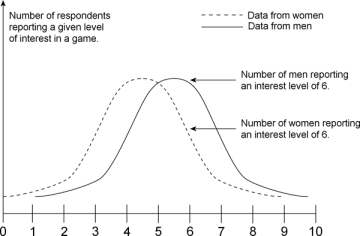- VandenBerghe's Five Domains of Play
- Gamer Dedication
- The Dangers of Binary Thinking
- Summary
- Design Practice Exercises
- Design Practice Questions
The Dangers of Binary Thinking
You can’t make a game for everyone, so your target audience is necessarily a subset of all possible players, a subset determined by your answers to the questions “Who will enjoy this game?” and “What kinds of challenges do they like?” As you answer these questions, you may be tempted to assume that the people in one category (adult men, for example) are a special audience that has nothing in common with people in other categories (adult women, children, teenagers, and so on). This is binary thinking: You assume that if group A likes a thing, everyone outside that group won’t like it. It’s unsound reasoning and may actually cause you to lose part of your potential customer base, as the following sections demonstrate.
Reasoning Statistically about Player Groups
Suppose you ask a group of players to rate their level of interest in a particular game on a scale of 0 to 10, with 0 representing no interest at all and 10 being fanatical enthusiasm. A few people will be at the extremes and the majority somewhere in the middle. If you graph the responses of men and women separately, you may find for a given game that the two groups have different arithmetic means; that is, the centers of their bell-shaped curves fall at different places on the graph.
Figure 4.3 shows this phenomenon. For the hypothetical game in question, men’s mean level of interest is at about 5.5, while women’s mean level of interest is at 4.5.

Figure 4.3 Reported level of interest in a game on a 0–10 scale
Note that while the graph does support the statement, “Men have a higher level of interest in this game than women do,” in fact, a large area of overlap indicates that a significant portion of the women surveyed are interested in the game as well. Furthermore, the number of women reporting an interest level of 6 is about two-thirds that of the number of men reporting the same interest level. In other words, two-fifths of all the people reporting an interest level of 6 are women—far too many to simply ignore.
This is only a hypothetical example. With some games, the level of overlap may be small, and there is no point in trying to reach out to an audience that simply isn’t there. A game for five-year-olds won’t appeal to many 15-year-olds. The point, however, is that for most ordinary games there is some overlap among different populations. (For example, many Disney movies made for children include more sophisticated content that only adults would notice or find funny, thereby giving the film a broad appeal.) It is foolish to ignore, or worse yet, to offend a minority audience simply because it is in the minority, without knowing how many people fall into that category. If you ignore or repel a significant minority, you’re throwing money away.
Strive for Inclusiveness, Not Universality
You cannot make a game that appeals to everyone by throwing in a hodgepodge of features because group A likes some of them and group B likes others. If you do, you will produce a game that has too many features and no harmony. For instance, you can’t make a game that appeals to action fans, to strategy fans, and to fans of management simulations by combining kung fu, chess, and Monopoly—the result would be a mess that appeals to none of them. On the other hand, you can include a story line in a fighting game so long as the story line doesn’t interfere with the gameplay. The story line adds depth to the game without driving away its key market of fighting-game enthusiasts, and it might attract the interest of people who otherwise wouldn’t pay any attention to a fighting game. Heavenly Sword and God of War are good examples.
Certain groups are turned off by particular content or features. For example, women don’t much care for material that portrays them as brainless sex objects; parents won’t buy games for their kids if the games are nothing but blood and gore; members of minority races (and many in the majority too) are naturally offended by racist content. These are the most obvious examples, but there are more subtle ones as well. Women are generally more sensitive to the aesthetics of a game than men are, and they are less likely to buy a game with ugly artwork. Some players have no interest in narrative material and are put off if they are forced to watch it in a genre that doesn’t normally include narratives. (This is why the story line in the kung fu game, mentioned earlier, shouldn’t interfere with the gameplay.) These examples illustrate the effects of exclusionary material—content or features that serve to drive players away from a game that they otherwise might like. Your goal should be to make the best game that you can about your chosen subject, while avoiding exclusionary material that unnecessarily hurts its appeal.